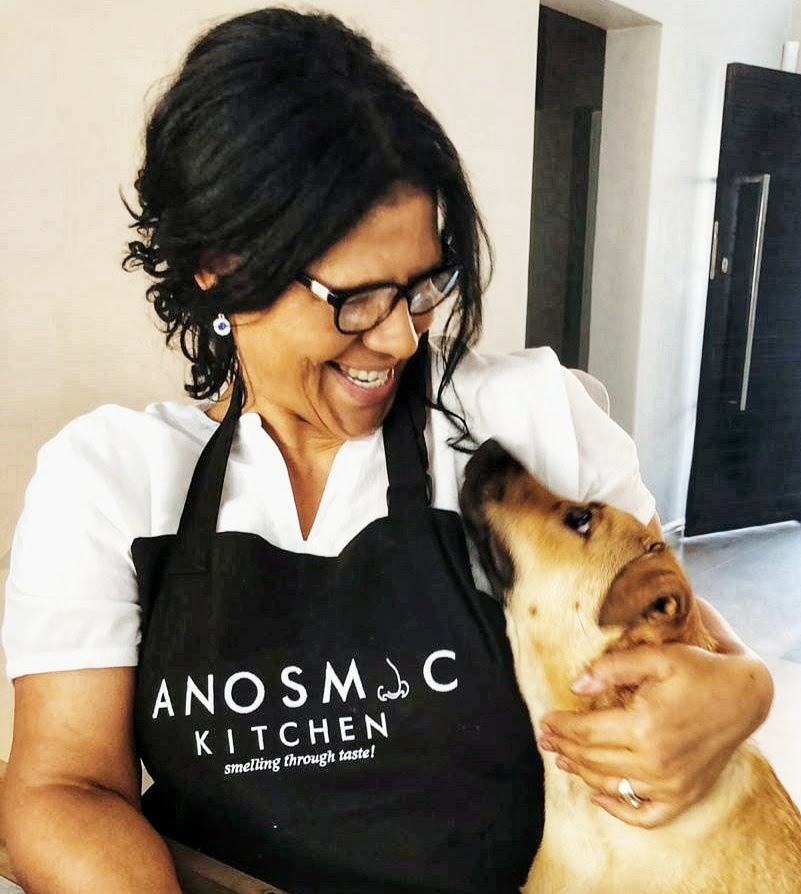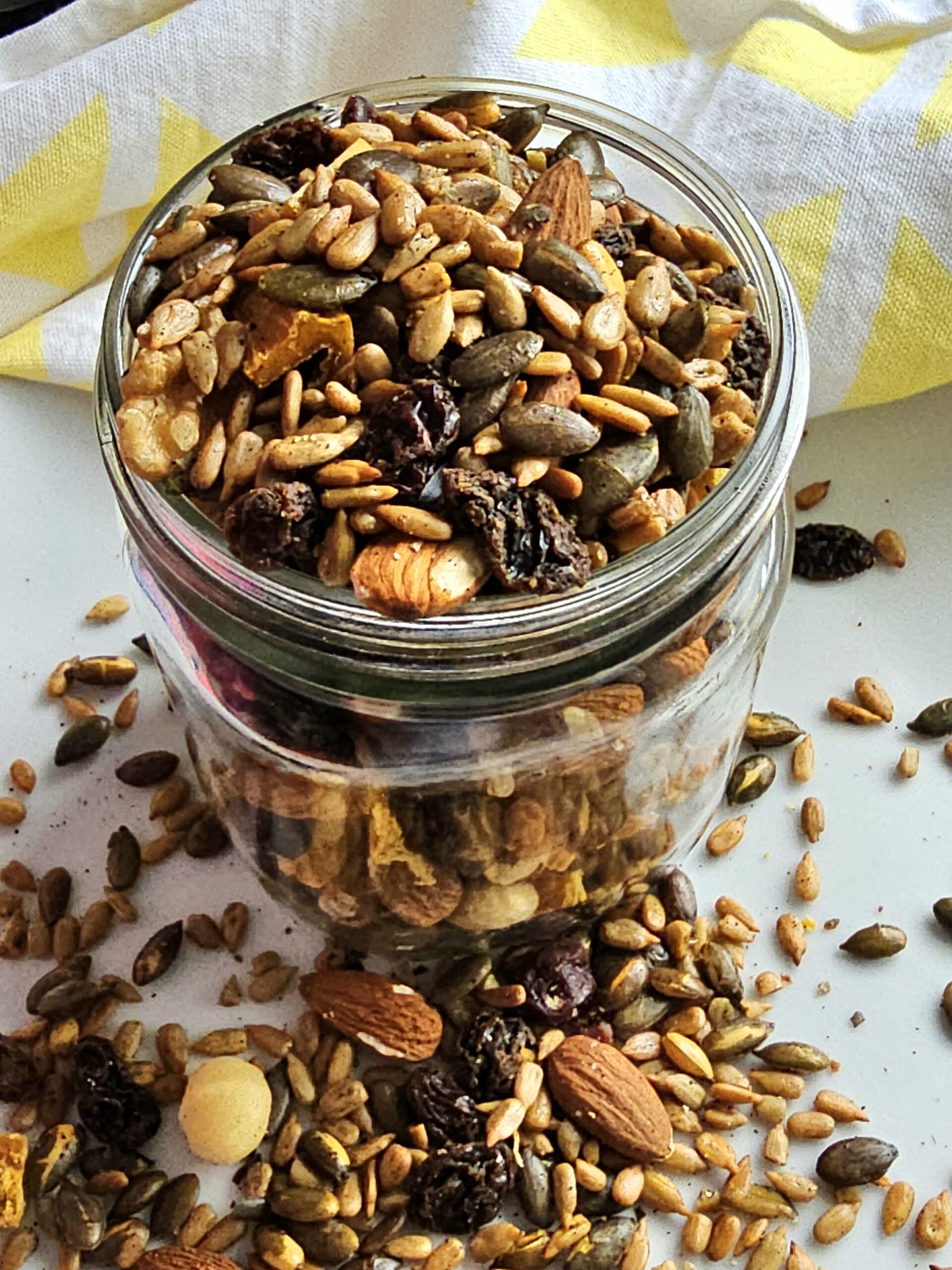A World Without Smell
This is me sharing a little information on anosmia. Some of it is my personal experience and some is from websites across the internet. All references are linked below this post.
Have you ever wondered what your favorite meal would taste like if you couldn't smell it? The surprising truth is, for millions of people worldwide, this isn't hypothetical.
Anosmia, the complete or partial loss of smell, affects a significant portion of the population and can significantly impact their daily lives.
In the image below, is Peanut our dog. He's been the smeller of My Anosmic Kitchen from day one. He walks into the kitchen with his nose pointed up sniffing and there's either two things happening, a) somethings about to burn (my anxiety) or something is smelling amazing and I want some! Taste test begins😀

The World Beyond Smell
Anosmia can be temporary or permanent, and the reasons behind it are varied. Common causes include upper respiratory infections, allergies, and sinus issues. Head injuries, certain medications, and even neurological conditions can also play a role.
Smell and taste are intricately linked. While taste buds on the tongue detect basic flavors like sweet, salty, sour, bitter, and umami, aroma molecules travel from the olfactory receptors in the nose to the brain, creating the full perception of flavor.
Without smell, to some who are anosmic, food can seem bland and one-dimensional. Not all have the same experience.
Myself for example, have been told that I smell through my mouth, which makes me retronasal. Be that as it may, for me personally, my tastes, are not limited to salty, sour, bitter, and umami. I taste all types of food and fortunately, congenital anosmia does not limit my tasting abilities.
Beyond taste, anosmia can have a surprising impact on safety. Our sense of smell plays a vital role in alerting us to dangers like spoiled food, smoke, and gas leaks. People with anosmia need to take extra precautions, such as regularly checking expiration dates and using smoke detectors with audible alarms.
Recipe Key Categories
I don't use a smoke detector with audible alarms but I do use a kitchen timer. To be fair though, I do this, as a precautionary measure only, because I've probably programed myself to have much higher senses in the kitchen.
The emotional impact of anosmia can also be significant. Food is a powerful source of joy and connection, and the inability to fully experience its aroma can lead to feelings of isolation and a diminished sense of well-being.
This above paragraph is from the internet and it might be from the Library of Medicine (not guaranteed). My personal take on this, is that, as a congenital anosmic, I cannot blame the lack of smell for any feelings of isolation that I may experience. I believe that everyone experiences isolation in one form or another.
Food blogging for example, can be a very isolating place to be, but in every situation there are good and bad perks. It's not what has happened to us, it's how we decide to use what has happened to us. I enjoy food, from cooking it, looking at it, touching, my idea of the aroma that fills my kithen brings me immense joy.
Despite the challenges, there is hope. For temporary anosmia, the underlying cause often resolves, bringing back the sense of smell.
For permanent cases, there are smell training techniques that can help people retrain their olfactory system. Additionally, anosmic cooks can develop their skills by focusing on texture, taste, and visual presentation to create delicious and vibrant dishes.
Anosmia research is ongoing, with scientists exploring new treatment options. In the meantime, understanding and acknowledging the condition can help those living with anosmia and raise awareness for this lesser-known condition.
Frequently Asked Questions
1. What's the difference between anosmia and hyposmia?
Anosmia is the complete loss of smell, while hyposmia is a partial loss. People with hyposmia may have a reduced ability to detect certain smells or may find all smells generally fainter.
2. How can I tell if I have anosmia?
There isn't a single definitive test for anosmia. Doctors may perform a physical examination of the nose and sinuses, and sometimes smell identification tests are used. However, the most common way to diagnose anosmia is simply by asking the patient about their own experience with smell.
3. Is there anything I can do to improve my sense of smell?
If your anosmia is caused by a temporary condition like a cold, it will likely return on its own once the underlying issue resolves. For people with permanent anosmia, smell training can be helpful. This involves regularly smelling specific scents in a structured way, which can help retrain the olfactory system.
4. Are there any risks associated with anosmia?
Beyond the impact on taste and enjoyment of food, for some anosmics, it can pose safety risks. Those
People with anosmia may not be able to detect smoke, gas leaks, or spoiled food. It's important to be extra vigilant about these dangers and use audible smoke and gas detectors.
My Conclusion
Anosmics who have lived with this condition (congenital anosmics) are more self trained and being aware is like second nature to us. There is more to the human being than the nose. There's ears, mouth, eyes, touch. The power of light and dark, movement, sensitivity, temperatures. Hot and cold. Cooking temperatures, room temperatures, food - hot chili or sweet tea. If we choose to focus on what we cannot do instead of what we can do, we limit ourselves.
5. Where can I find more information about anosmia?
Several organizations offer resources and support for people with anosmia. Here are a few:
- Fifth Sense On one page of Fifth Sense is food for thought, link below: https://www.fifthsense.org.uk/
- Food For Thought (where you can also find some of my recipes): https://www.fifthsense.org.uk/recipes/
- The American Academy of Otolaryngology-Head and Neck Surgery: https://www.entnet.org/
- The National Institute on Deafness and Other Communication Disorders: https://www.nih.gov/about-nih/what-we-do/nih-almanac/national-institute-deafness-other-communication-disorders-nidcd
- The National Library of Medicine: https://www.ncbi.nlm.nih.gov/books/NBK279408/
- Cleveland Clinic: https://my.clevelandclinic.org/health/diseases/21859-anosmia-loss-of-sense-of-smell
To learn more about me, please visit this page and to see all my recipes, visit my recipe index
Stay In Touch!
When you subscribe to my newsletter you receive weekly free recipe round-ups plus a FREE recipe ebook packed with delicious recipes. Click on the free recipe ebook link or on the image below to get your free copy.














